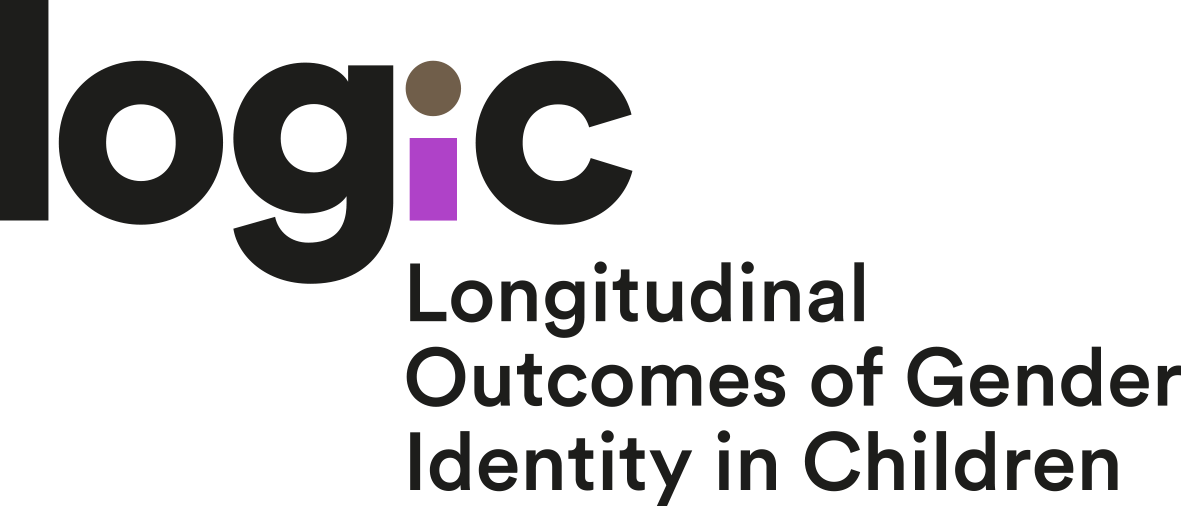
Longitudinal Outcomes of Gender Identity in Children (LOGIC)
Overview
Aims
This Longitudinal Outcomes of Gender Identity in Children (LOGIC) study aims to investigate the outcomes of children and young people referred to the UK Gender Identity Development Service and the factors associated with these outcomes. Specifically, the study aims to establish: (1) the proportion of children and young people who experience ongoing gender dysphoria and access medical treatment; (2) factors that are associated with ongoing gender dysphoria and treatment choice; and (3) how (A) medical treatment, (B) social transition and (C) co-occurring autism impact physical health, well-being, quality of life, peer and family relationships and cost to the National Health Service (NHS) and other public services.
The study has recruited children, young people and parents/caregivers prior to being seen by the service and is committed to following them over time, regardless of whether families choose to remain in contact with clinical services or not.
The qualitative sub-study of LOGIC, LOGIC-Q, aims to explore the experiences and well-being of a diverse sample of children and young people referred to the UK GIDS, and their parent/caregiver over a 2-year period. Specifically, the study aims to explore and examine (1) children and young people's experiences of gender identity, how this changes over time and links to health and well-being; (2) parental experiences of having a gender-questioning child, how this changes over time and support needed to promote their child's health and well-being; (3) children, young people and parental perspectives on outcomes that are important for evaluating health services and treatments for gender-diverse children; (4) children, young people and parental experiences of health services, therapies and support and how these can be enhanced.
Institution
University College London (UCL), Tavistock and Portman NHS Foundation Trust, University of Liverpool, University College London Hospitals NHS Trust, University of Cambridge.
Geographic coverage - Nations
UK and Republic of Ireland
Geographic coverage - Regions
Nationwide
Start date
2019
Catalogue record last updated
09/02/2026
Sample
Sample type
Cohort study
Sample details
Participants were children and young people (CYP) aged 3–14 years at the time that their referral to the Gender Identity Development Service (GIDS) was accepted, and their parent or caregiver. Referrals to the service can be made by Child and Adolescent Mental Health Services, or from other health, social care, or educational professionals, including GPs. The service does not accept self-referrals from CYP or their families. In order for the referral to be accepted, the referral must indicate that the CYP is experiencing concerns or distress around their gender identity.
Inclusion criteria for CYP were: had a referral to the GIDS accepted; awaiting first appointment with the service when baseline measures were completed; speak English; live in the UK or the Republic of Ireland. Exclusion criteria for CYP were: aged >14 years at the time their referral to the GIDS was accepted; already attended an appointment at the GIDS before baseline measures were completed; do not provide assent to take part; and do not have parent/caregiver consent. Parents/caregivers of eligible CYP will be asked to provide informed consent in order to participate and must also be proficient in English and live within the UK or the Republic of Ireland.
The LOGIC-Q sub-sample was comprised of 39 families who took part in the quantitative LOGIC study. The group was purposively sampled to be diverse in relation to assigned sex at birth, current age, social transition status (socially transitioned, partially socially transitioned and no social transition), ethnicity, diagnosis of Autism, socio-economic status and geographical location.
Sample size at recruitment
627 families (LOGIC)
39 families (LOGIC-Q)
Sample size at most recent sweep
459 families (Wave 2 - LOGIC)
31 families (Wave 2 - LOGIC-Q)
Sex
All
Age at recruitment
3-14 years
Cohort year of birth
Varied
Data
Data access
Contact study team by emailing logicenquiries@tavi-port.nhs.uk to express an interest in accessing the data
Genetic data collected
No
Linkage to administrative data
Health data
Key Papers
Longitudinal Outcomes of Gender Identity in Children (LOGIC): protocol for a prospective longitudinal cohort study of children referred to the UK gender identity development servicedoi.org/10.1136/bmjopen-2020-045628 Longitudinal Outcomes of Gender Identity in Children (LOGIC): a study protocol for a prospective longitudinal qualitative study of the experiences and well-being of families referred to the UK Gender Identity Development Servicedoi.org/10.1136/bmjopen-2020-047875 Thinking Time, Shifting Goalposts and Ticking Time Bombs: Experiences of Waiting on the Gender Identity Development Service Waiting Listdoi.org/10.3390/ijerph192113883 Stories of absence: Experiences of parental and familial rejection among gender-diverse children and young people< a href="https://doi.org/10.1016/j.ssmqr.2025.100550">doi.org/10.1016/j.ssmqr.2025.100550 "I was being true to myself": Listening to young people talk about gender identity and transitiondoi.org/10.1016/j.ssmqr.2025.100550
Additional information
Website
logicstudy.uk
Notes
Includes waves of LOGIC-Q qualitative sub-study.
Related themes
Biomarkers,
Loneliness and social isolation,
Puberty,
Physical health assessment,
Reproductive health,
Sexuality and gender identity,
Victimisation and life events
Mental health measures timeline
Sweep name:
Cohort member age:
Data collection period:
Notes:
Physical health measures:

